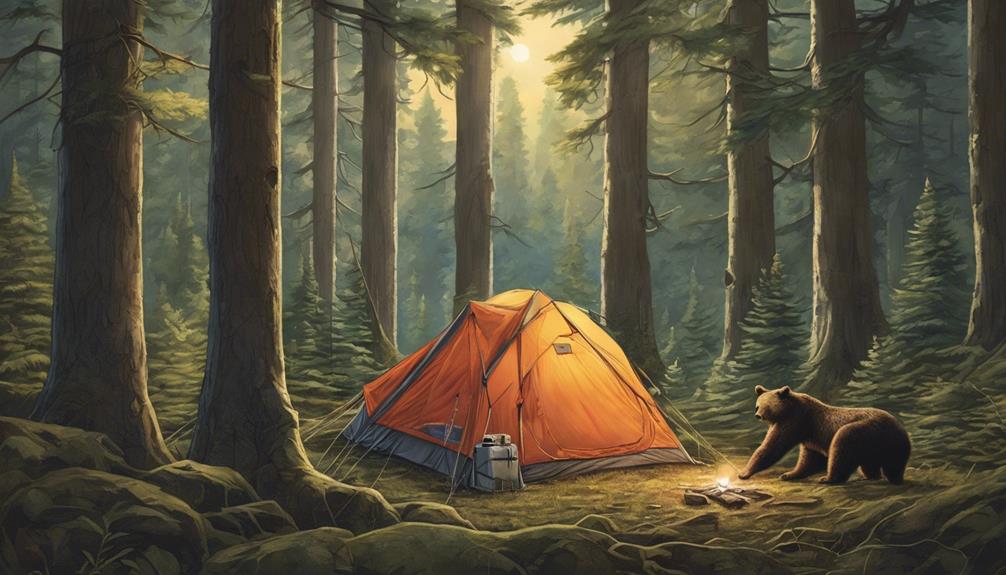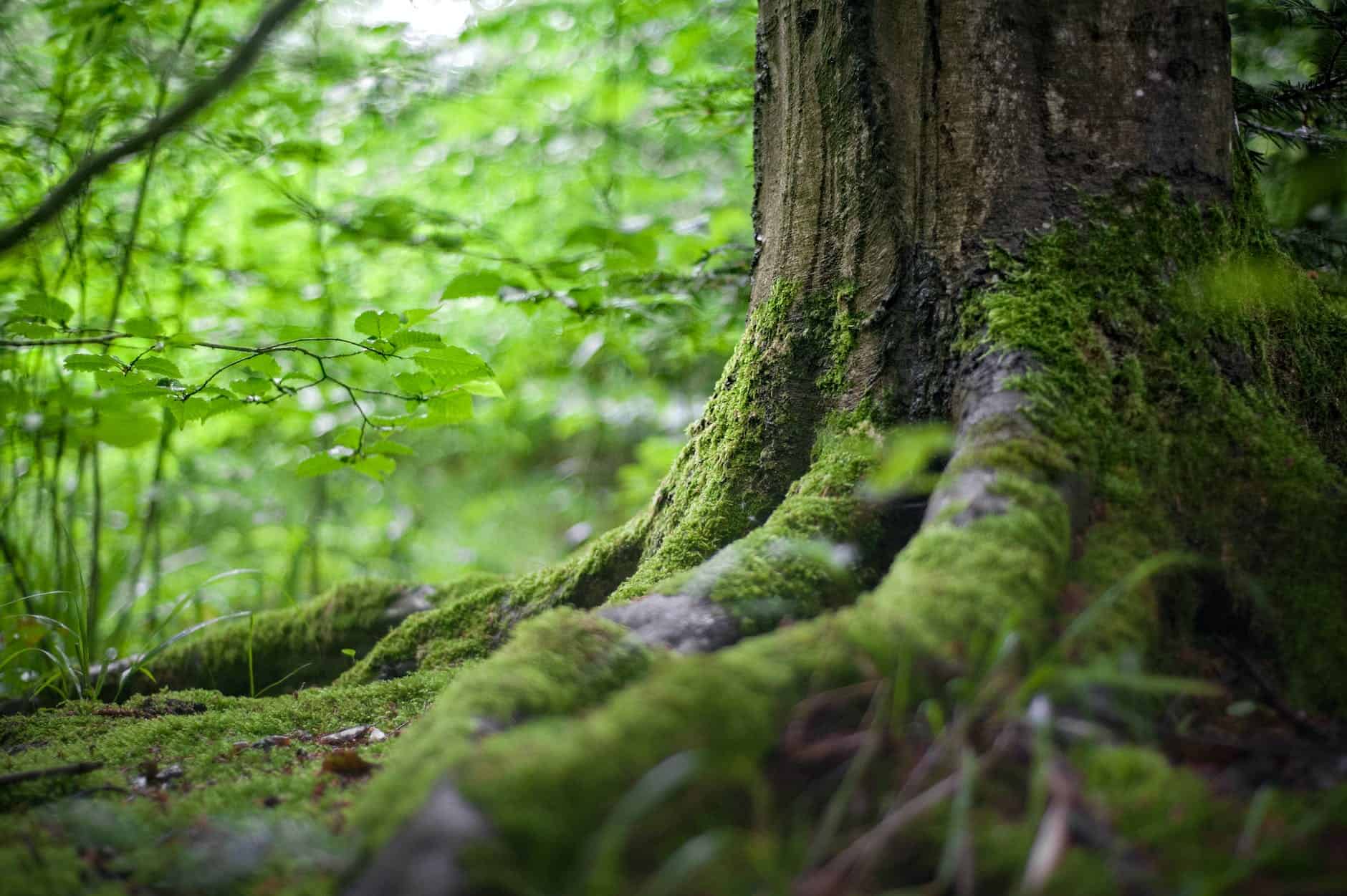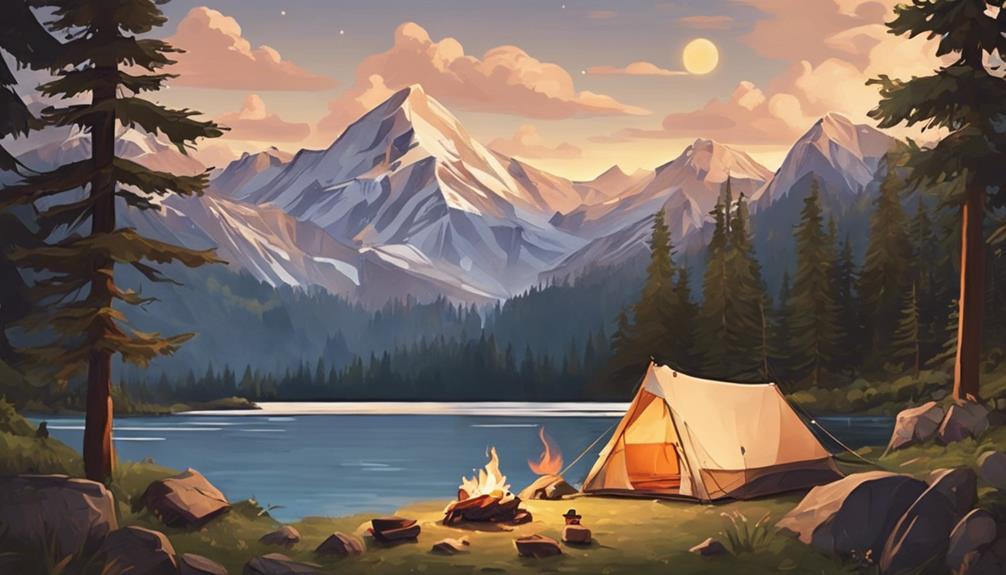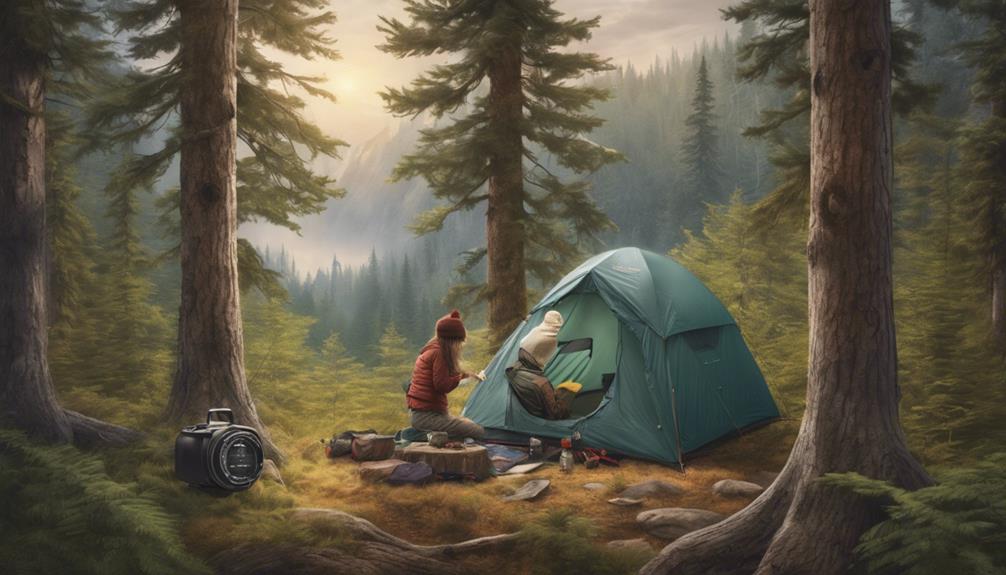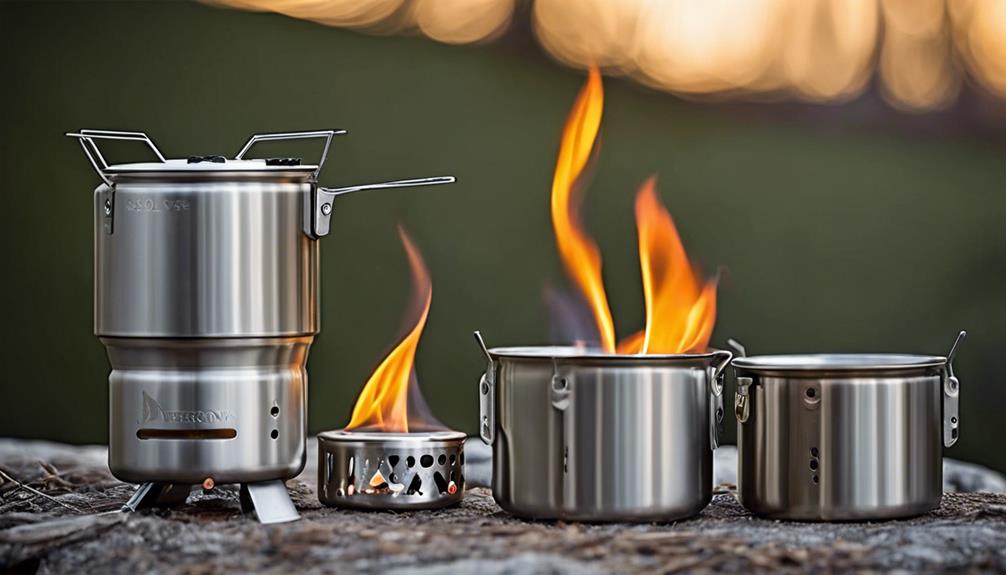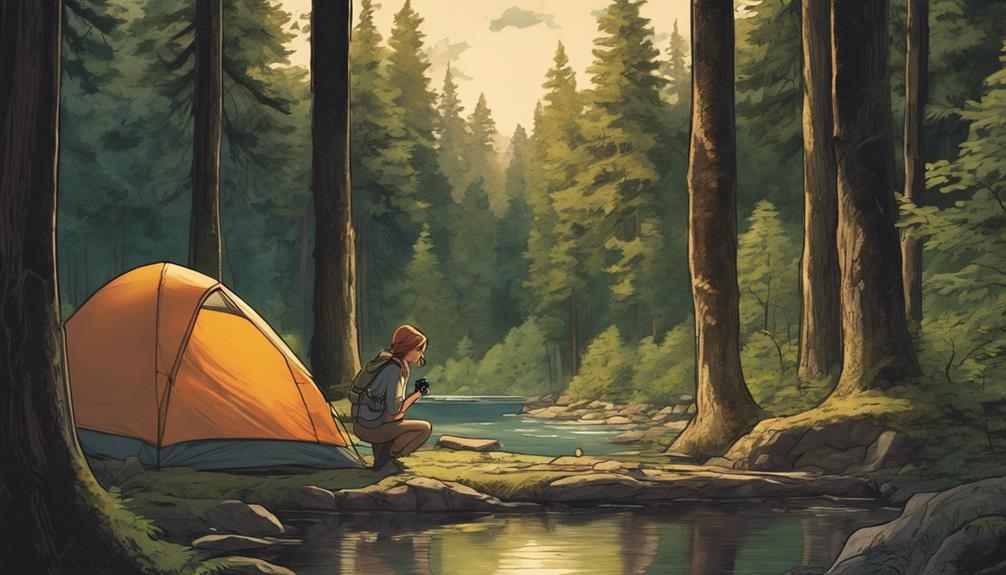When embarking on solo tent camping trips, it is crucial to prioritize safety. Choose a secure campsite, look for flat terrain far from water, and establish an emergency plan. Carry navigation tools, remain vigilant of your surroundings, and inform a trusted individual of your itinerary.
Remember to handle emergencies, secure food from wildlife, and respect their space. Following these top 5 safety tips will ensure a worry-free wilderness experience.
Key Takeaways
- Choose a secure campsite away from hazards and near help.
- Carry essential tools for navigation like a map and compass.
- Be prepared for emergencies with a locator beacon and first aid skills.
- Stay connected with others and share your itinerary.
- Be cautious of wildlife, secure food, and carry deterrents.
Setting Up a Safe Campsite
When embarking on a solo tent camping adventure, it's crucial to carefully choose and prepare a safe campsite to ensure a comfortable and secure outdoor experience. The first step is to know the area well before setting up camp. Choose a level spot that's clear of hazards like falling branches or rocks that could damage your tent or cause injury. Setting up your tent on flat ground is essential for a good night's sleep, as it prevents discomfort or rolling during the night.
Safety should always come first when camping solo. Keep a safe distance from water sources to avoid unexpected flooding or accidents. Clear the campsite of debris, rocks, and sharp objects to prevent injuries to yourself and damage to your camping gear. Properly secure your tent stakes to ensure stability in windy conditions and prevent your tent from collapsing. By taking these precautions and setting up your campsite with safety in mind, you can enjoy a worry-free solo camping experience.
Navigating the Wilderness
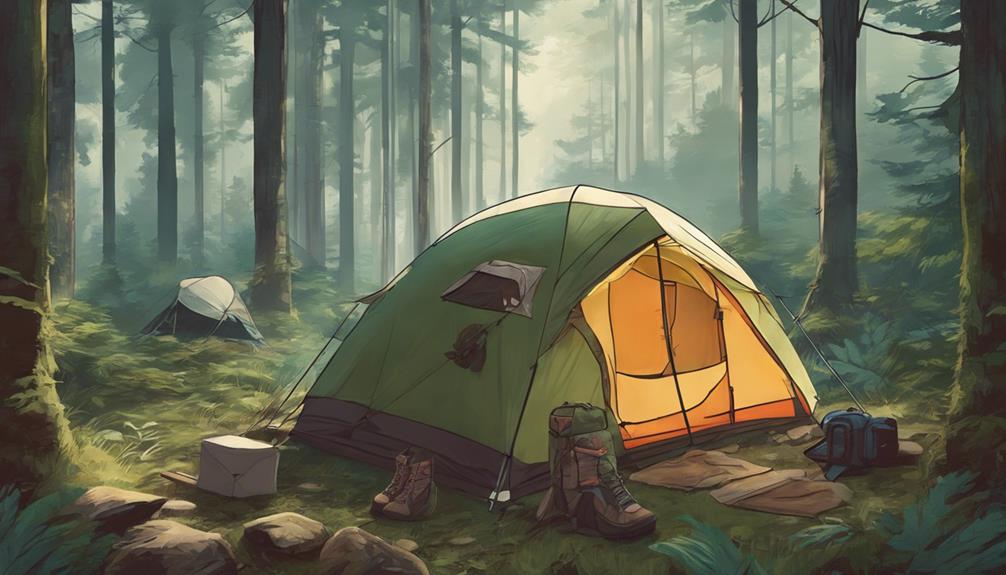
Navigating the wilderness successfully requires carrying essential tools such as a detailed map, compass, and GPS device for accurate orientation. When embarking on a solo camping trip, being well-prepared is crucial for a safe adventure. Alone in the wild, it's vital to learn basic orienteering skills to read maps, identify landmarks, and follow trails effectively. Before setting out, carefully plan your route, considering water sources, emergency exits, and potential hazards along the way. Familiarize yourself with the terrain features and natural landmarks to aid in navigation, enhancing your overall camping experience.
Park rangers often advise campers to stay aware of their surroundings and regularly check their position to prevent getting lost in the wilderness. Additionally, carrying a first aid kit is essential for any outdoor excursion, providing you with necessary supplies in case of emergencies. By mastering the art of navigating the wilderness, you can confidently explore nature while ensuring your safety during your camping trip.
Handling Emergency Situations
In case of emergencies during your solo tent camping adventure, having an emergency GPS locator beacon can be a lifesaving tool for signaling for help in remote areas. This device allows you to call for assistance when faced with unexpected situations or medical emergencies.
Additionally, it's crucial to learn basic first aid skills to address injuries promptly before help arrives. A detailed emergency plan, including contacts and evacuation routes, should always be on hand for quick reference. Stay vigilant of weather changes to prepare for storms or extreme temperatures that could lead to emergencies.
Make sure to pack essential emergency supplies such as food, water, and shelter in your camping gear. Being well-prepared can make a significant difference in handling emergency situations effectively. Remember, staying calm and knowing how to signal for help when in remote areas is vital.
Staying Connected With Others
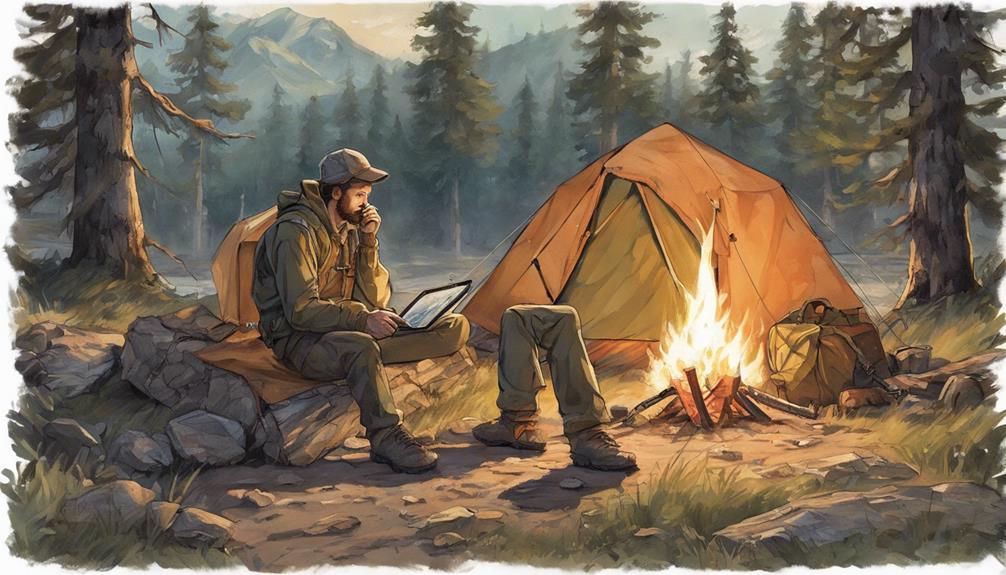
To maintain a sense of security and connection during solo tent camping adventures, it's imperative to establish reliable communication channels with others. When camping alone, sharing your camping itinerary with a trusted individual ensures that someone is aware of your plans and can act promptly if an emergency occurs.
Additionally, utilizing emergency devices such as a personal locator beacon or a satellite phone is crucial to staying connected during your solo trip. These devices can be lifesaving tools in case of unexpected situations.
Choosing campsites with cell service or proximity to civilization enhances your connectivity, providing peace of mind and a way to reach out if needed. In areas with limited cell reception, consider using walkie-talkies or portable radios for communication purposes.
Another helpful tip is to carry a portable power bank to keep your phone charged, ensuring you can stay connected with others throughout your camping adventure. By taking these safety precautions and staying connected, solo campers can enjoy their outdoor experience while being prepared for any unforeseen circumstances.
Being Mindful of Wildlife
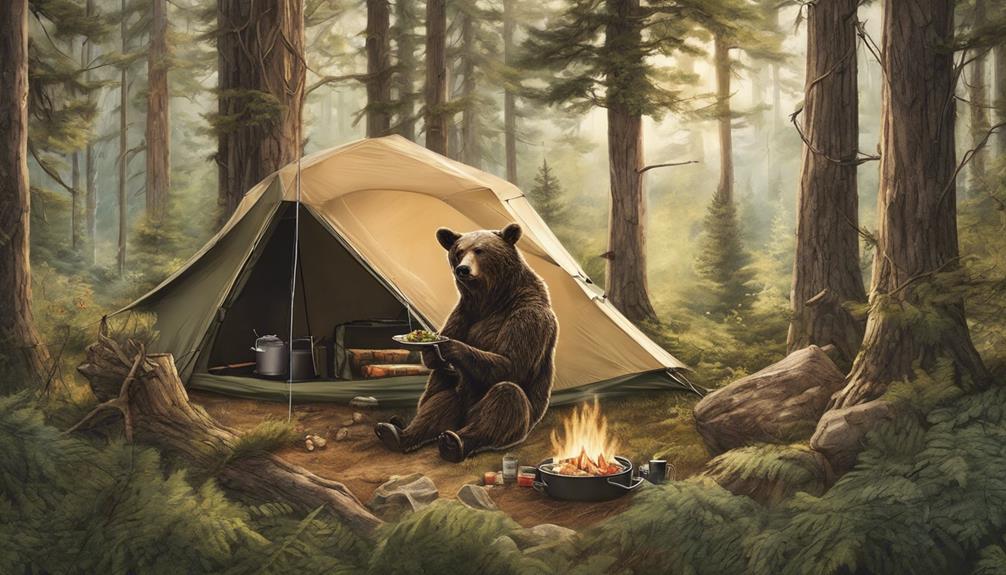
Understanding the local wildlife behaviors and habits in your camping area is essential for anticipating potential encounters during your solo tent camping adventure. Being mindful of wildlife is crucial to ensure a safe and enjoyable experience in nature.
Here are some key tips to help you navigate wildlife encounters effectively:
- Secure food and trash: Properly store your food and dispose of trash to prevent attracting wildlife to your campsite.
- Follow safe interaction guidelines: Familiarize yourself with protocols for wildlife interactions to avoid conflicts or dangerous situations.
- Stay informed about wildlife activity: Keep abreast of any recent wildlife sightings or activity in the area to adjust your camping practices accordingly.
- Carry wildlife deterrents: Equip yourself with bear spray or other deterrents to enhance safety in case of unexpected wildlife encounters.
- Respect wildlife: Remember to observe wildlife from a safe distance and avoid disturbing their natural habitat to minimize potential risks.
Frequently Asked Questions
What Are the Safety Tips for Tent Camping?
When tent camping, safety is key. We always prioritize securing our campsite, keeping it clean, and packing a comprehensive first aid kit.
Understanding emergency contacts and nearby facilities is crucial for a worry-free adventure.
Is It Safe to Tent Camp Alone?
Absolutely, solo tent camping can be safe with the right precautions. By staying aware, prepared, and following safety guidelines, risks can be minimized.
It's crucial to inform others of your plans and carry emergency devices for added security. Opting for well-lit and populated campsites can also enhance safety.
What to Do While Solo Camping?
While solo camping, we enjoy various activities like hiking, stargazing, and bird watching to connect with nature. It's a time to practice mindfulness, meditation, and try new hobbies like outdoor cooking and photography.
Journaling and sketching are great for capturing memories. Taking time for self-reflection and personal growth while immersing in the solitude of camping is essential for enhancing the experience.
How Can a Woman Go Camping Alone?
When we go camping alone as women, it's crucial to prioritize safety. Trust your instincts, avoid sharing your exact location on social media, and inform a trusted person of your plans.
Stay aware of your surroundings and interact with park staff for guidance. Being cautious of suspicious behavior is key. These practices help us enjoy solo camping adventures responsibly and confidently.
Can I Use the Safety Tips for Solo Tent Camping for Any Kind of Solo Camping Adventure?
Yes, you can definitely use the solo camping safety essentials for any kind of solo camping adventure. Whether you’re backpacking, hiking, or biking, having the right gear and knowledge to stay safe is crucial. Don’t forget to pack the necessary items and always be prepared for any situation.
Conclusion
In conclusion, solo tent camping can be a thrilling experience, but safety should always be the top priority. By following these top 5 safety tips, you can ensure a successful and enjoyable adventure in the great outdoors.
Remember, it's better to be safe than sorry, so always be prepared for the unexpected.
Happy trails and may your campfire always burn bright!

